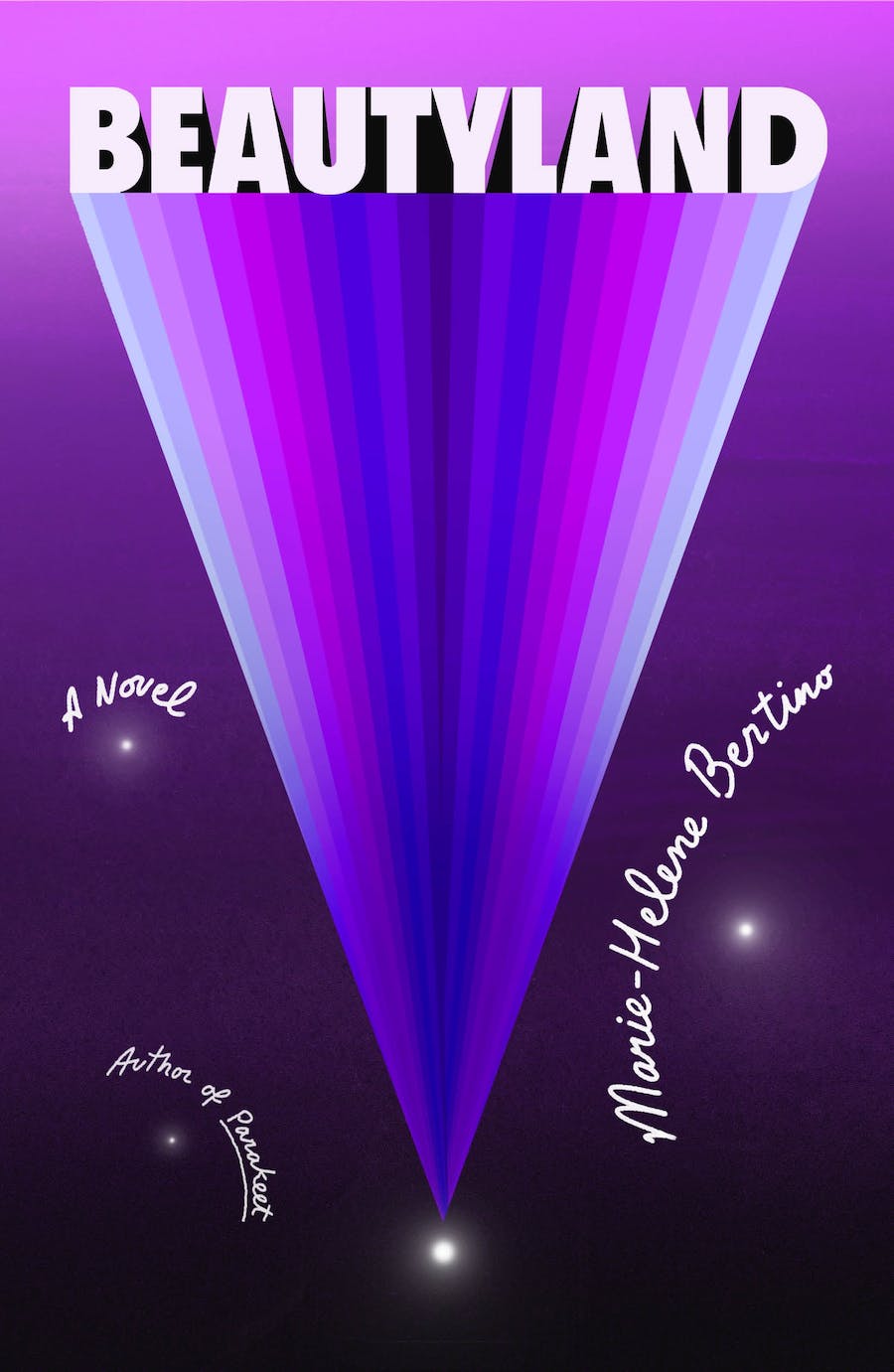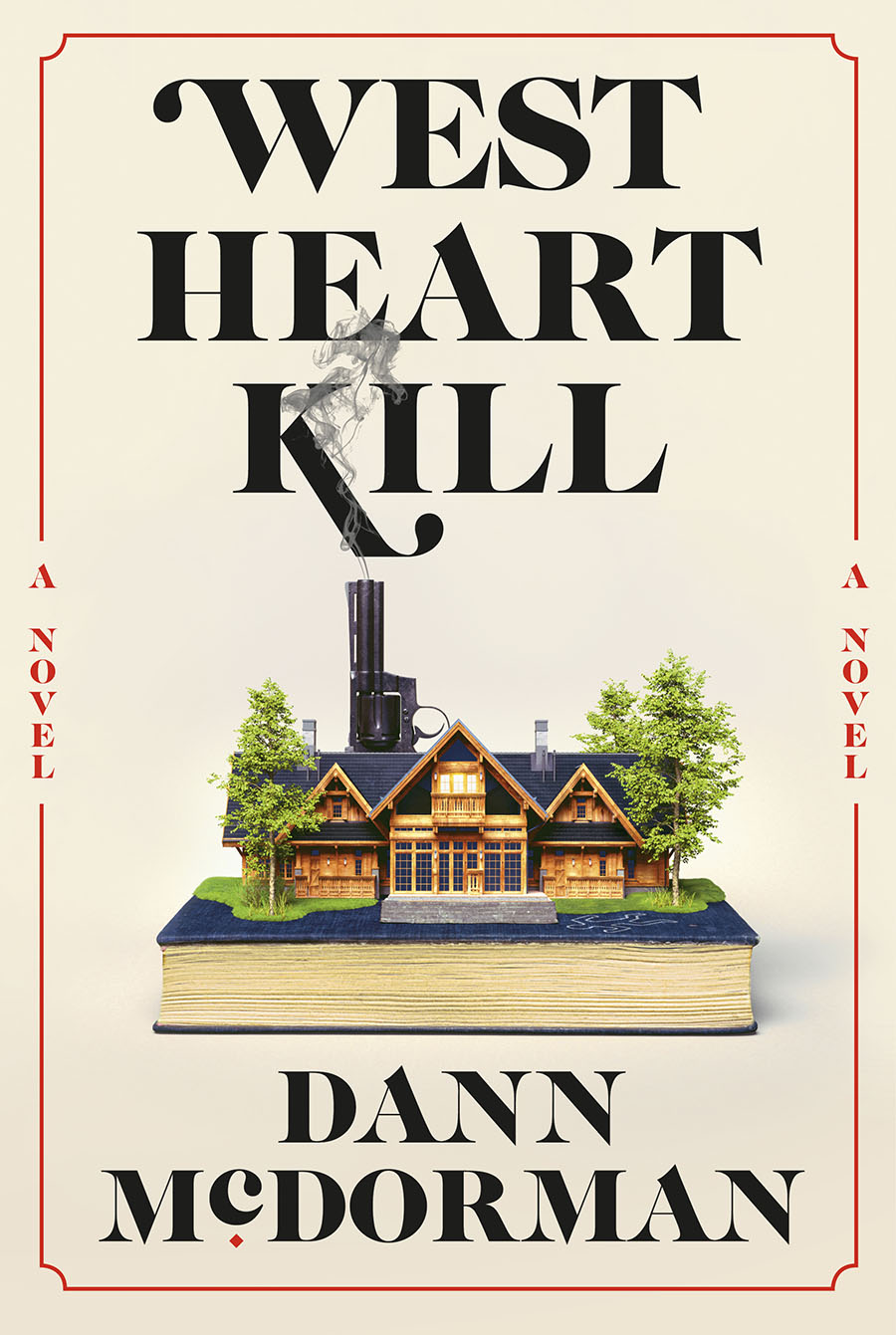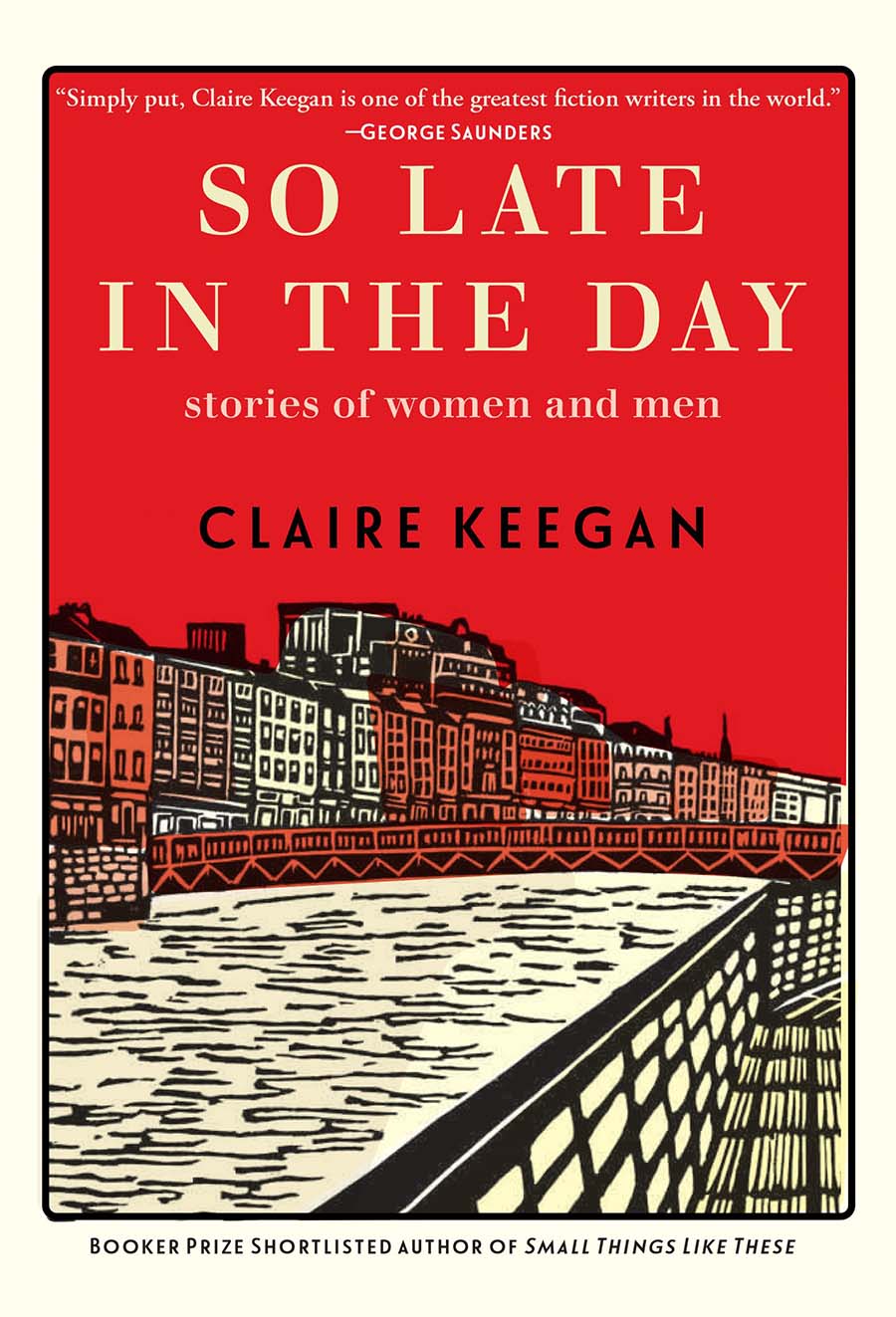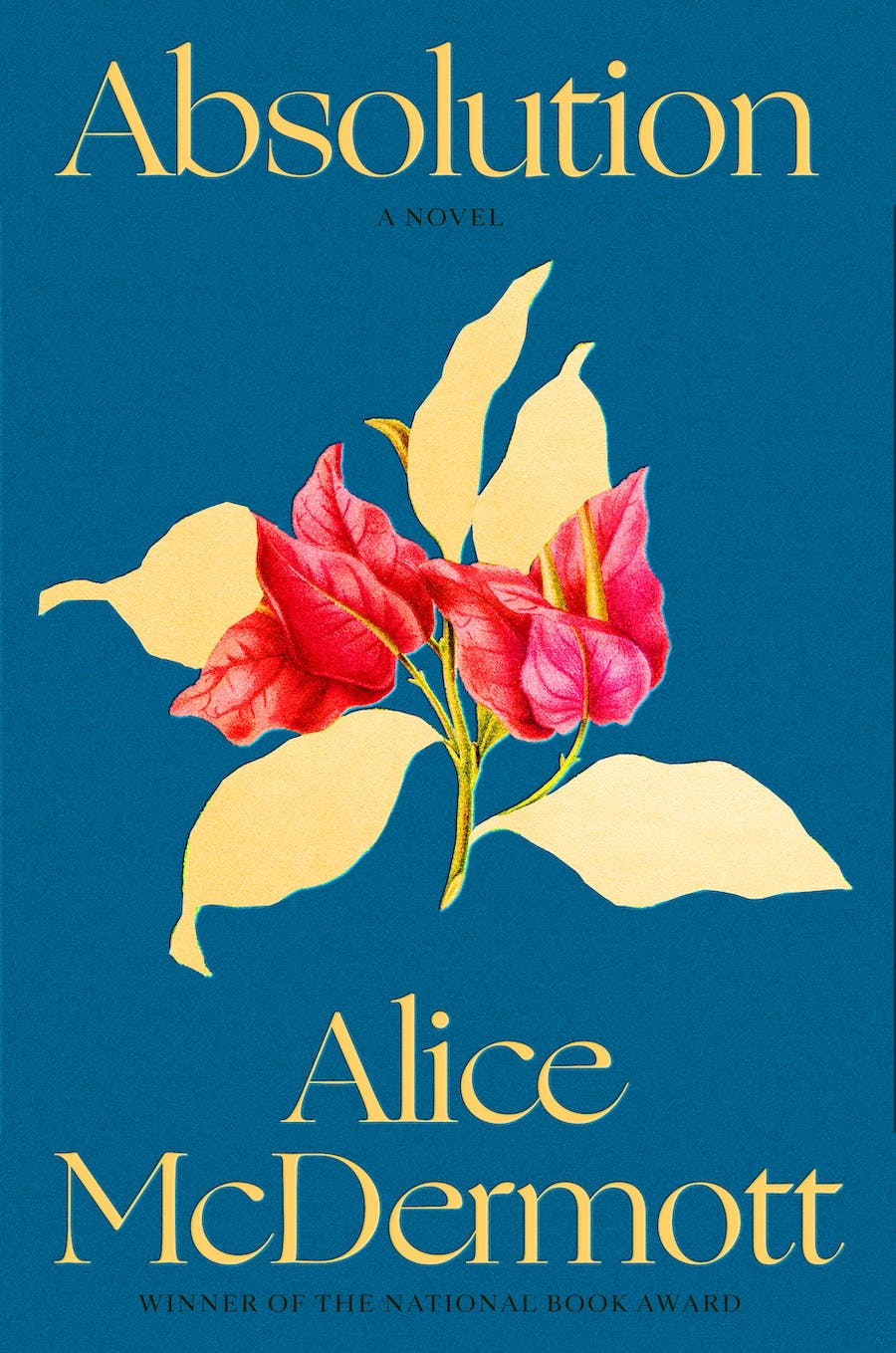The Review is pleased to share staff picks for the holiday season: a curated gift guide for every book lover on your list.

Though calling my pick a holiday pick may be a bit of a stretch—its publication is set for January 16th—Marie-Helene Bertino’s novel Beautyland is a celebration of the new year in the same way holiday lights can (and, I argue, should) stay lit for weeks after Christmas. Beautyland will arrive just as the optimism of the new year tends to start wearing off, when we may find ourselves returning to our old patterns after the transient thrill of a fresh start. This is a book to turn to when we most need reminding of the chance to reexamine our ways of being.
In 1977, at the precise moment when Voyager 1 is launched into space, Adina, the novel’s extraterrestrial protagonist, is born in Philadelphia. She’s been sent by her home world, whose planet is dying, to report back on Earth’s habitability. She learns to do so with available technology, which means her dispatches are sent via fax machine. Such a choice should indicate Bertino’s approach here—while Beautyland draws on sci-fi tropes, it also ironizes them, and in doing so subverts the reader’s expectations for what a story about an alien can be. Bertino’s novel is a coming-of-age story, one that’s hyperfocused on the unfolding of one young woman’s life, but it’s also epic in its sweeping view of the universe.
A voice as singular, authentic, and penetrating as Adina’s is rare. Her faxed messages, which are meant to explain humanity to her “superiors,” are at once hilarious and crushing:
Human beings, Adina faxes, did not think their lives were challenging enough so they invented roller coasters. A roller coaster is a series of problems on a steel track. Upon encountering real problems, human beings compare their lives to riding a roller coaster, even though they invented roller coasters to be fun things to do on their days off.
Human beings, Adina faxes, spend their lives pretending their parents are people with no needs. They do not want their moms to talk about sex or die.
When someone dies, where does the way they eat egg rolls go?
Adina’s dispatches may remind some readers of Craig Raine’s poem “A Martian Sends a Postcard Home.” Similar to the poem, many of Adina’s faxes take the form of descriptive reports, and both works depend on a defamiliarization of the ordinary absurdities of the human world. But what sets Beautyland apart is Bertino’s willingness to immerse us in Adina’s life in a way that amplifies its distinctly temporal and fleeting nature while also revealing the fragility of human life to be intensely beautiful. Between each of Adina’s dispatches, the novel form has the space to unearth and dwell in the experience of being human, rather than just take inventory of it. And when Adina faxes the question, When someone dies, where does the way they eat egg rolls go?, she is not simply describing grief to her superiors. To her, grief is not a static facet of the human experience that can be explained the way other things, like roller coasters, can. Adina comes face-to-face with the irreconcilable nature of human mortality, just as every human at some point must, and she is changed. This is how Beautyland goes further than the alien dispatches that have come before it; Bertino not only acknowledges death as a part of life, she delves in and struggles with it, and she is unflinchingly sincere in her portrayal of Adina’s journey.
In rhythmic, poignant prose that wholly resists the cynicism that reminders of our mortality can inspire, Bertino pays uncompromising attention to the most ordinary parts of our lives, thus making them into something precious. Adina’s alien perspective enables us to see everything anew: the pleasure and strangeness of having a body, the ways we can create meaning for each other, the simple joy of the perfect sesame bagel, and the tender, ephemeral conditions that bind all human beings together.
Whether Adina is really an extraterrestrial being (I want to believe) or merely a confused person like the rest of us is for the reader to decide. Regardless, Beautyland is a salve for the alienation that comes with being human. It’s an invitation to return to the world, to look around with wonder, to fall back in love with the miracle of this planet and its inhabitants. It promises to jolt you out of your stale ways of thinking and seeing, something we all need as we move into the new year. Give yourself a gift this year and preorder Beautyland; it couldn’t be arriving at a better time.
—Madison Sellers, Editorial Assistant

West Heart Kill by Dann McDorman is a book that subverted all of my expectations. Under the guise of a Knives Out-esque noir set at a high-class 1970s-era hunting lodge, the novel opens on a Fourth of July weekend plagued by a debilitating storm and the discovery of three corpses. That description, along with my penchant for taking a chance on debut authors, was enough to hook me. I did worry that the cover copy, which boldly claims that West Heart Kill is “no ordinary whodunit” and “wholly original” would jinx the book, but as is the case with the best mysteries, I was in for a surprise.
McDorman’s novel pays homage to the tropes and conventions of classic noir, but it is also a case study about the mystery genre itself. It’s narrated in the second person, and McDorman describes the clues and suspicions the reader picks up with deft and knowing passages like:
They laugh but you are thrilled; you think, perhaps, of the plot of “The Most Dangerous Game,” in which a rich eccentric lures unsuspecting men to his island, to hunt for sport. . . . Is this to be that kind of story? But listen, they are speaking again.
In such moments, McDorman shows how attuned he is to the reader’s perceptions; at times I felt as if he was plucking the thoughts right out of my head. And as the reader encounters this cast of troubled and monied club members with names that “you might discover on a melancholy walk in the rain through a forgotten New England graveyard,” they learn alongside protagonist and private detective, Adam McAnnis, that the familiar beats of novels like this—secrets, death, injury, adultery, and apparent suicides—are (fittingly enough) both par for the course and, perhaps, not what they might seem. In addition to the book’s core mysteries and the puzzles hidden within them, McDorman skillfully weaves discussion of such common genre tropes (e.g. “the locked door,” the narrator-as-killer, and the implications of different murder weapons) into the novel itself. These are accompanied by fascinating bits of genre history, like the strange disappearance of Agatha Christie. I hesitated the first time McDorman interrupted the fast-paced momentum required of a mystery with literary analysis; I worried that these inclusions might be off-putting and leave me wanting to skip the craft lecture to get to the so-called “good stuff.” However, McDorman makes these passages enthralling enough to stand on their own and cunningly pertinent to the mystery at hand. It quickly becomes clear, from both the narrative style and deviations from tradition—there are, among other additions, a redacted cast list of the main players, word problems you might find in a child’s math workbook, and pop quizzes that might remind you of an American Lit class—that McDorman wants the reader to participate in the assembly of the mystery’s pieces. These quizzes start out innocently enough, asking the reader to answer questions like: Who do you think the murderer(s) could be? Who do you think will become the victim(s)? However, the questions quickly take an eerie turn, asking the readers to look inward on themselves and their own culpability. In doing so, McDorman implicates the reader in this story—and in its telling—even going so far as to ask:
7) What emotion would be most likely to drive you to kill? (Select only one.)
LOVE
HATE
8) Do you ever look at your spouse or lover, during moments when they’re unaware of your gaze—reading a book like this one, perhaps—and calculate the sum of your regrets? Do you ever imagine a life without them, and consider what you’d be willing to do to make that happen? Do you ever wonder if they’re thinking the same about you?
Such questions made me set the book down, look over my shoulder, and contemplate my own psyche—how different am I really from the characters in this book? What would desperation drive me to do?
While this approach might sound daunting, it turns West Heart Kill into an unforgettable and immersive experience where, for this reader at least, I felt as if I had a real stake in the story, as though my involvement was vital to the process of unraveling the mystery at the novel’s center (though I won’t say much more on this as it edges into spoiler territory). Read this book if you love a good mystery, and especially if you want the space to think critically about the ways contemporary mysteries can play with form and convention while also subverting tropes and expectations. While admittedly not for everyone, West Heart Kill lives up to its daring claims and presents a novel unlike any I’ve ever read before.
—Brighid Griffin, Editorial Assistant

This past October, I had the pleasure of attending Claire Keegan’s reading at Montgomery Bell Academy in Nashville. She is, at the moment, white-hot and in stiff competition with Sally Rooney for the title of Ireland’s most famous living writer, especially after her novella Small Things Like These was a finalist for the 2022 Booker Prize. After reading from the long story “So Late in the Day,” Keegan, pleasantly flinty during her Q & A, also mentioned, in an Irish brogue so mellifluous I could’ve listened to her for hours, that she was soon off to Australia for a month-long equestrian holiday. Kudos, then, to a woman who grew up dirt poor on a farm in County Wicklow and became a library cormorant in her early adulthood after returning home from Loyola with a fancy pair of degrees to a country so economically broken, she quit seeking work after unsuccessfully applying to nearly three-hundred jobs. Kudos, as well, to Grove Press—the final accelerant in this formula for world-beating literary stardom—whose gorgeously designed editions feature startlingly spare woodcut images, bright as Christmas cookies and about the same size, that not only make great stocking stuffers but harken back to simpler times, when book jackets were beautiful and spare and called out to you in bookstores, Buy me. Each is also so short—the longest of them runs 118 pages—you can devour all three in a single sitting.
I inhaled Foster and Small Things Like These and the entirety of So Late in the Day (it consists of three stories) in a matter of hours. There are enormous pleasures to be had from Keegan’s work. They are written in prose as quiet, unobtrusive, and as psychologically piercing as Chekhov’s stories (a major influence, according to Keegan); they are also curiously propulsive in spite of the fact that the scale of her events tends to be, well, small. For me, however, the most enticing quality of Keegan’s prose her is style, which manages to locate her characters not only within very particular places but in their bodies, so that the setting in each is lush with the joy of being in the world, even if it characterized by squalor or desperation. Should we call it a luxuriant vividness? Here’s an excerpt from “The Long and Painful Death,” a story I found especially satisfying, its two paragraphs exemplifying what makes Keegan so engrossing and imminently readable. A writer—a single woman, we’ll learn, who has stiff-armed many suitors to achieve a hard-won self-reliance—arrives at her residency on Achill Island; she will be working in the former home of the German Nobel laureate Henrich Böll for an indeterminate period of time:
The caretaker had told her where to find the key, and eagerly her hand searched around the gas cylinder. There were several keys on the ring but the first she chose turned the lock. Inside, the house had been renovated: the kitchen and sitting-room now combined into one long, open room. The same whitewashed fireplace was set at one end but a new sink and cabinets were fitted at the other. In between there stood a couch, a pine table and hard, matching chairs. She let the tap run and boiled the kettle for tea, lit a small fire with turf from the basket, and made up a temporary bed on the couch. Just outside the panes, a hedge of fuchsia was trembling brilliantly in the very early morning. She undressed, lay down and reached for her book and read the opening paragraph of a Chekhov story. It was a fine paragraph but when she reached its end she felt her eyes closing, and happily she turned out the light knowing that tomorrow would be hers, to work and read and walk along the roads and to the shore.
When she woke, she felt the tail end of a dream—a feeling, like silk—disappearing; her sleep had been long and deeply satisfying. She boiled the kettle and took her belongings from the car. She had brought little: some books and clothes, a small box of groceries. There were notebooks and several scraps of paper on which half-legible notes were written. The sky was cloudy but promising, streaked with patches of blue. Down at the ocean, a ribbon of water rose into a glassy wave and fell to pieces on the strand. She felt hungry to read, and to work. She felt she could sit for days, reading and working, seeing no one. She was thinking of her work, and how exactly she would start, when the house phone rang.
These passages are a travel advertisement for an Irish writing retreat. Please sign me up for the Böll residency ASAP! They are also a masterclass in everything from setting to foreshadowing to tone—I could easily cite numerous examples from the other books—and they end on the very fateful interruption of quiescence around which all great works of fiction pivot. (The caller, a man—a stranger to our protagonist—wishes to see the residence; he is standing right outside her door; she asks him to return later in the evening, when she is properly composed; he agrees, albeit gruffly, even ominously, to the later visit; upon his arrival that night, disturbing complications ensue.)
Do these little books of Keegan’s deserve their wildly enthusiastic praise? Is she, as George Saunders opines, “one of the greatest fiction writers in the world”? On the verge of being a Keegan completist—I confess I immediately ordered Walk the Blue Fields after I was done with the aforementioned—I find myself agreeing with Tara Menon’s assessment, in her piece on the 2022 Booker Prize for the Sewanee Review, that in Keegan’s work—well, at least in Small Things Like These—there “is not enough darkness here, not enough punch.” As is the case with Charles Dickens, another clear influence of hers, you sometimes see all the goodness and evil and self-sacrifice coming from a mile away before she nails another of her endings. But her gloriously artful restraint and cuts-you-to-the-quick imagery meant that even a Scrooge like me shed a few tears, a couple of which were motivated by admiring envy, and then bought these as presents for practically all the passionate readers on my Christmas list.
—Adam Ross, Editor

In Alice McDermott’s Absolution, there is a finely stitched line that separates genuine altruism from an ulterior motive. Set against the backdrop of Saigon in 1963—just before the CIA-backed coup d’état in November of that year—housewife (or helpmeet, per the parlance of the period) Tricia Kelly sheds her newlywed bliss as the American War gradually unfolds before her: “You have no idea,” Tricia says, “what it was like. For us. The women, I mean. The wives.” Intimately dwelling on midcentury conceptions of patriotism, McDermott’s latest novel tussles with the question of whether absolution is, ostensibly, a divine indulgence that is rooted in earnest conviction or a flimsy human construct.
While Tricia’s attorney husband, Peter, lends his services as a “civilian advisor” at the behest of the United States Navy’s intelligence, she finds herself in the company of one of the other wives, Charlene—wicked smart, wicked beautiful, and wicked mean—who channels her own marital discontent into do-gooder charity for the women and children in and around Saigon. Tricia is, refreshingly, sober in her outlook on these acts of service: “I’ve heard the phrase of late, ‘white savior.’ Charlene, despite her freckles, would have fit the bill.” Charlene’s imprecise selflessness—her schemes to employ local women to hand-sew áo dàis for Barbie dolls (at five bucks a pop), a one-off suggestion that Phan, a Vietnamese mother, might be inclined to give away her newborn to an American family for five-thousand dollars (Tricia bristles at such endeavors: “She was talking about selling a baby”)—pierces the righteous, inflated Yankee ethos that pervaded those early years in Vietnam (and, one could argue, the ethos of America since its inception). Consider a passage which appears early on in the novel, where Tricia encounters a child in the local hospital who is presumably burned by napalm:
But now, holding her in my arms for however long I stood there—not long—I understood that the sound of her cries was only a continuation, a reverberation, of her initial scream, perhaps days or weeks ago, when she felt the first touch of the flame, as if her initial, desperate flight from that pain was somehow coiled still in her thin bones. I became overwhelmingly aware of this small body: her bones and tender flesh, her heartbeat, her pulse, and then, somehow, of the bones, the pulse, the heartbeat of those who had brought her into life, who had formed her, as well as bone, flesh, pulse, voice of those who had formed them.
McDermott does not turn away from the imposed violence that punctuates this period, nor does she turn a blind eye to the military-industrial complex that carved a new facet into the blood-red stone of Western barbarity. Brutality thrums throughout, haunts even the loveliest afternoons: Tricia heeds “the distant thudding of artillery . . . from the other side of the river . . . the distant tracing of fire we could see now and then from the happy confines of our barbed-wired homes.”
The slippery guise of charity work allows these women to manufacture some semblance of achievement for their time spent in Southeast Asia—and this praxis is uncomfortable for the reader as it is critical toward the general notion of well-to-do American imperialism. Absolution is a masterclass in the contemporary American novel: The past shines a terrible, bright light onto the present—the present shines a terrible, even brighter light into the future.
And all the while, there are dresses that need sewing; cocktails to be shaken at the endless garden parties; men in their pressed khakis who require dinner at five o’clock. When Tricia thinks about Phan and the fate of her newborn—whether the child was sold off to a wealthy American family or whether she stayed in Vietnam with her mother “through all that was to come”—Tricia cannot decide as to which fate is preferable: “Disorienting, this not even knowing what to hope for. A blessing, too, I suppose. The shrug that casts off guilt.”
Such is the way, it seems. Absolved? Who’s to say.
—Luke Gair, Assistant Editor
